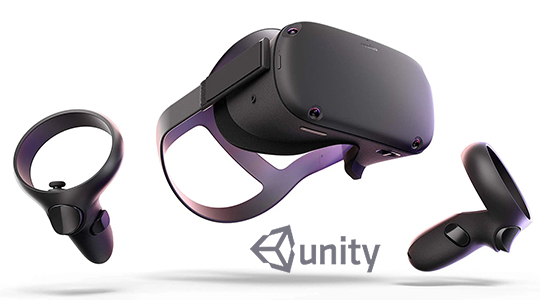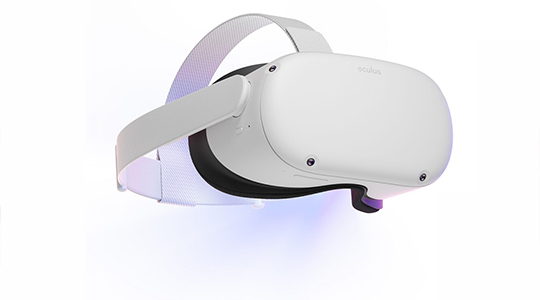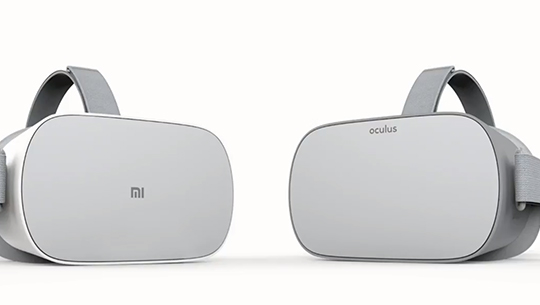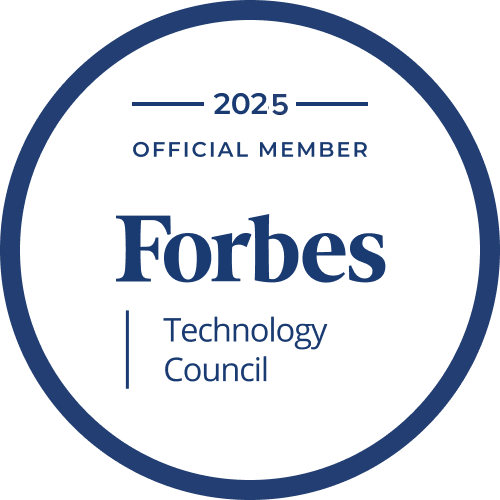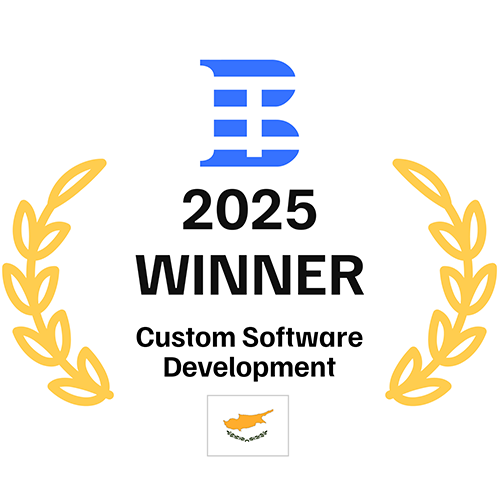Choosing a gaming engine for virtual reality app development can often be complex. Among the multitude of available game engines, most developers tend to lean towards either Unity or Unreal Engine. Each of these tools has its unique advantages and potential disadvantages.
However, this discourse aims to explore the significant benefits of utilizing Unreal Engine to create robust virtual reality software, particularly for the Oculus Quest platform. By understanding and assimilating the provided information, you will be able to construct and visualize your VR app in Unreal Engine effectively.
Before you embark on the journey of developing immersive products for Oculus Quest in Unreal Engine, it's crucial to establish your developmental approach. You need to decide whether you wish to create the application internally, collaborate with an augmented team, or outsource the project to a proficient Unreal Engine development company. Each of these methods comes with its respective challenges.
In Oculus Quest and Unreal Engine VR development, the decision to utilize Unreal Engine can result in significant benefits. As a powerful tool, Unreal Engine is renowned for delivering advanced graphics, superior performance, and exceptional software flexibility for Oculus Quest 2 Unreal Engine applications. Thus, when you decide to build VR in Unreal Engine, be prepared to unlock a world full of remarkable benefits, insightful revelations, and much more!
Why to Develop VR Software for Oculus Quest with UE?
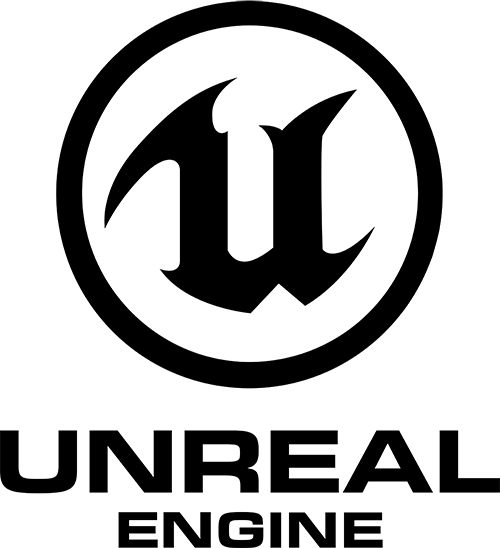
Regarded as one of the most advanced VR headsets in the contemporary market, Oculus Quest has found extensive application in a plethora of sectors. Its usage ranges from interactive video games to immersive VR training software and applications relevant to the manufacturing industry.
When combined with the transformative capabilities of Unreal Engine VR, developers are often amazed at the extensive array of tools and features available to them to create outstanding virtual environments. There are numerous reasons to select the powerful combination of the Unreal Engine as the game engine of choice and Oculus Quest as the immersive VR headset. This combination provides:
Exceptional graphics quality. Unreal Engine, notably its 5th iteration, is renowned as a game engine that brings cutting-edge global illumination technology, robust performance, and flexible graphic configurations. Leveraging the power of Unreal Engine 5 alongside Oculus Quest 2, you ensure that your VR product possesses the highest visual quality possible within the virtual reality environment.
Accessibility for developers. Whether developers are working in-house or are outsourced to undertake a project, they often express satisfaction with this toolkit. The combination of Unreal Engine and Oculus Quest provides a comprehensive range of options coupled with a user-friendly interface, thus lowering the entry threshold for VR development.
Versatility. After mastering Unreal Engine and its suite of VR plugins, developers are equipped to work on projects that demand superior graphics and immersive technology. The engine's flexibility, facilitated by visual scripting via Blueprints, user-friendly plugins, and the power of C++, means those responsible for an Oculus Quest project are well-equipped to develop any other product within the industry.
Indeed, if you are unfamiliar with how to use Oculus Quest 2 with Unreal Engine, rest assured that a wealth of online guides, courses, and forums are readily available to help you navigate this process. The same resources apply to understanding how to connect Oculus Quest 2 to Unreal Engine. Thanks to the straightforward connectivity provided by a simple USB A to USB C cable included with the headset, setup should be a seamless experience.
In essence, the collaboration of Oculus Quest with Unreal Engine — whether it's Oculus Quest 2 Unreal Engine or Unreal Engine Meta Quest 2 — marks an exciting frontier in virtual reality. By harnessing the power of VR in Unreal Engine, developers can unlock a myriad of possibilities to create rich and immersive experiences in virtual reality.
Oculus Quest in Unreal Engine 4
Regardless of the version you opt for, pursuing VR development in Unreal Engine is widely recognized as one of the most beneficial business strategies. This owes to the software's dynamic versatility, superior graphic quality, and promising cross-platform potential. Whether developed for Oculus Quest in Unreal Engine 4 (UE4) or in the latest Unreal Engine 5 (UE5), virtual reality applications consistently deliver optimized performance and high-quality graphics, with no significant disparity between the two versions.
Indeed, creating a VR game or a comprehensive training program can still be efficiently undertaken in Unreal Engine 4. Presently, most applications fortified by immersive technologies do not necessarily exploit the innovative features associated with Unreal Engine 5, such as Lumen, Nanite, or MetaSounds. Consequently, if you aim to develop robust VR applications for platforms like Oculus Quest 2 or Meta Quest 2, Unreal Engine 4 remains a reliable and powerful tool in your development arsenal.
Embracing Unreal Engine VR development offers an opportunity to tap into a rich suite of tools and capabilities, providing developers with a highly flexible and potent platform for crafting immersive virtual experiences. Despite the rise of newer versions, using Unreal Engine 4 for Oculus Quest VR development still offers a compelling balance of performance, graphics quality, and compatibility. In the ever-evolving virtual reality world, Unreal Engine continues to be a robust and reliable platform for creating rich, engaging VR experiences.
Oculus Quest in Unreal Engine 5
If your aim is to employ only the most advanced technologies in your virtual reality development process, then embracing Unreal Engine 5 for Oculus Quest 2 becomes the prime choice. As a leading-edge solution, Unreal Engine 5, the latest version of one of the most renowned game engines, offers dynamic global illumination, unparalleled graphics, and versatile optimization tools to deliver immersive VR in Unreal Engine.
When it comes to software development specifically designed for virtual reality, the distinct advantages conferred by Unreal Engine 5 can be fully leveraged by seasoned developers. These professionals possess the skill and know-how to maximize the potential of a game engine, ensuring the creation of high-quality virtual reality experiences. This is why each iteration of Unreal Engine, from Unreal Engine Oculus Quest to Unreal Engine Meta Quest 2, provides unique benefits as well as challenges. However, any potential drawbacks can readily be mitigated when placed in the capable hands of expert developers.
In conclusion, the field of virtual reality software development, particularly when utilizing Unreal Engine VR, is a dynamic landscape teeming with opportunities. Whether one chooses to develop for Oculus Quest in Unreal Engine 4 or Oculus Quest 2 in Unreal Engine 5, the platform's potential is immense. This is essentially thanks to Unreal Engine's continuous evolution to meet and exceed the needs of the fast-paced and ever-growing virtual reality industry.

Oculus Quest in Unity or Unreal Engine? — Quick Comparison
The rivalry between Unity and Unreal Engine is notably pronounced in the competitive landscape of game engine technologies. Both platforms present unique features and benefits, with their selection often hinging on the specific requirements of the project in question. The table below illuminates some of the defining characteristics of each:
Unity
- Delivers video graphics of commendable quality and versatility.
- Employs C# as the primary programming language, supplemented with Bolt, a convenient visual scripting tool.
- Presents a straightforward, user-friendly interface, complemented by a wealth of free tutorials, a supportive community, and easily comprehensible official documentation.
- Is particularly well-suited for indie projects, mobile-only products, and development teams with varying levels of experience.
- Provides robust 2D support and fosters a vibrant community on platforms like Reddit.
Unreal Engine
- Equips developers to work on high-end AAA projects courtesy of its advanced graphic capabilities, including those related to Oculus Quest in Unreal Engine and Oculus Quest 2 Unreal Engine development.
- Requires developers to learn either C++ or visual coding through its unique system called Blueprints.
- While the learning curve may be steeper, mastering Unreal Engine's tools proves to be highly rewarding, especially for VR development in Unreal.
- Facilitates a rapid development workflow for professionals who can leverage its full potential.
- Provides optimized functionality for artificial intelligence and superior network support.
Regarding the comparison of Unity vs. Unreal, each has unique strengths and areas of specialization. For example, Unreal Engine VR development provides a powerful platform for crafting high-quality, immersive virtual reality experiences, particularly for platforms like Oculus Quest or Meta Quest 2. In the dynamic field of virtual reality, the choice between these two powerful engines depends on your project's specific needs and your development team's expertise.
Examples of Virtual Reality Apps Built in Unreal Engine
Aside from traditional games created inside Unreal Engine, developers often prefer its tools to make virtual reality apps for Oculus Quest. This Meta’s headset is supportive of almost all the most innovative technologies, which enables companies to build quality, reliable, and entertaining training simulators, games, etc. Let’s take a look at a couple of successful examples.
Aircraft Engine Virtual Reality Training

Although widely associated with gaming and entertainment, virtual reality technology has been effectively adopted across industries to support personnel training in a risk-free environment, providing hands-on experience. One such application is the Aircraft Engine VR training simulator. This tool offers valuable insights into the intricate operation of complex machinery. Solutions like these accelerate the onboarding process and minimize the risk of human error during physical interactions in the workplace.
Crafted with Unreal Engine VR, the Aircraft engine VR training simulator provides an immersive environment for swift acclimatization to the training process. It presents a virtual space where an airplane engine stands at the core. Within this VR in Unreal Engine application, trainees can interact with various components of the engine and other objects, lifting, rotating, and examining each in detail. This results in the ability to disassemble the airplane's hardware into multiple interactive parts, enhancing the understanding of the engine's inner workings. Doesn't that sound like an impactful solution?
Virtuoso — A Virtual Reality Music Playground
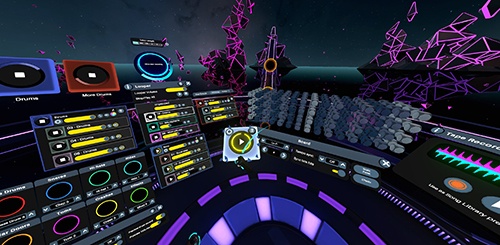
While traditional learning methods can often become tedious for young learners venturing into new fields, innovative solutions like Virtuoso have transformed the learning experience, especially in fields like music. Virtuoso, developed using Unreal Engine VR, facilitates the practice and creation of electronic music within an immersive virtual reality sandbox. Notably, once your composition is complete, it offers the convenience of sharing your musical creations on various social media platforms.
Introduced on Oculus Quest in Unreal Engine, Virtuoso is another significant step toward realizing the metaverse - the envisioned future of interconnected virtual reality spaces. Specifically, Virtuoso combines engaging gameplay with the ability to create or reproduce music and share your work online. These form the core elements of interactive virtual environments that seamlessly blend learning and gaming. Leveraging the Oculus Quest 2 Unreal Engine, it showcases how VR in Unreal Engine can reinvent conventional education methods.
Vermillion: Virtual Reality Painting Simulator
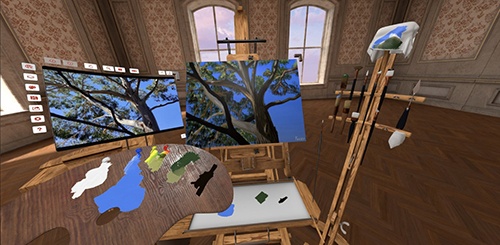
Similar to Virtuoso, Vermillion exemplifies the power of Unreal Engine VR by enabling users to engage with virtual reality assets using the Oculus Quest headset. By blending gameplay with art creation within a virtual environment, Vermillion underscores the future of gamification and how it will reshape learning practices. With such applications, the world of e-learning is elevated, delivering immersive experiences that transcend traditional boundaries.
Through the Oculus Quest in Unreal Engine, you can master virtual tools like a palette and an easel, painting on a virtual canvas as though it was real. The most intriguing aspect? There's no need for costly physical tools, making applications like Vermillion an all-inclusive platform for learning and entertainment. Moreover, this painting simulator provides a mixed-reality mode, enriching the user experience even further, all made possible through the Oculus Quest 2 Unreal Engine. Through VR in Unreal Engine, it shows how virtual and reality converge to create unique and engaging learning environments.
Create a Reliable Oculus Quest App with Program-Ace
In today's rapidly advancing technological landscape, as the reality of the metaverse edges closer, VR-based applications are setting new industry standards across diverse sectors, ranging from training simulators to games. Traditional software solutions are being eclipsed by forward-thinking XR technologies, making each new product in this realm a veritable treasure trove for its owners.
Recognizing these advantages, the ideal time to delve into the virtual reality market is now, ideally in partnership with seasoned industry experts like Program-Ace. With a solid 30-year track record in the industry, Program-Ace offers a comprehensive range of services within the immersive technology domain and beyond.
To swiftly tap into the current trends and bring your unique Oculus Quest product to fruition, all you need to do is contact us. We guarantee a prompt response and unwavering support throughout your journey. By using the Unreal Engine VR for Oculus Quest, we can help you leverage the power of virtual reality to its fullest potential, thereby ensuring the success of your venture in this exciting new reality.
FAQ
Selecting a suitable game engine is an essential consideration for any Virtual Reality (VR) project. The Unreal Engine emerges as a leading choice for developers considering the Oculus Quest platform. Here are some compelling reasons why you should use Unreal Engine for Oculus Quest VR development:
High-quality graphics. The Unreal Engine is renowned for its powerful graphics capabilities, making it an ideal choice for creating visually stunning virtual reality experiences on the Oculus Quest. With Unreal Engine's virtual reality tools, developers can maximize the graphic potential of Oculus Quest hardware, resulting in visually impressive, immersive, and engaging VR experiences.
Extensive VR toolkit. Unreal Engine VR provides an extensive set of tools specifically designed for virtual reality development. From stereoscopic rendering to spatial audio and intuitive motion controls, Unreal Engine supports all key aspects of VR design. When developing for Oculus Quest in Unreal Engine, you get access to a feature-rich VR toolkit that can significantly streamline your development process.
Blueprint visual scripting. One of Unreal Engine's unique features is its visual scripting system, known as Blueprints. This system is particularly useful for virtual reality development, allowing non-coders to create complex interactions and behaviors, thus democratizing the development process. When working with the Oculus Quest 2 Unreal Engine, even developers with limited coding skills can contribute significantly to the project.
Support for Oculus Quest hardware. The Unreal Engine has been optimized to support Oculus Quest hardware specifically, reducing the amount of work necessary to adapt your virtual reality project to the platform. This means less time spent on technical adjustments and more time dedicated to refining your VR experience.
Active development community. The Unreal Engine benefits from a large, active community of developers who regularly share their knowledge, tutorials, and advice. This supportive environment can be particularly valuable for tackling any challenges that may arise when developing VR in Unreal Engine for the Oculus Quest.
Continual updates. Epic Games, the company behind Unreal Engine, continuously updates the engine with new features and improvements. This ensures that your Oculus Quest VR projects always benefit from the latest advancements in virtual reality technology.
Based on our observations, the combination of Unreal Engine and Oculus Quest offers an optimal development environment for VR. High-quality graphics, an extensive virtual reality toolkit, a supportive development community, and continual updates make Unreal Engine an excellent choice for Oculus Quest VR development. Whether you are working on a game, an interactive experience, or a training simulator, the combination of Unreal Engine and Oculus Quest can help bring your virtual reality vision to life.
Utilizing VR (Virtual Reality) technology in the aviation industry is a progressive stride that has the potential to enhance safety and improve overall operations. A VR training simulator, particularly one developed in an advanced engine such as the Unreal Engine, can be a game-changer in pilot training and maintenance procedures, significantly contributing to aviation safety. Here's how:
Risk-free training environment. A virtual reality training simulator allows trainees to encounter and navigate through various scenarios in a controlled, safe environment. This risk-free setting permits the practice of responding to critical situations without fearing real-world consequences. In this way, Unreal Engine VR can simulate high-risk scenarios, allowing pilots and crew members to practice their responses and decision-making skills.
Detailed equipment understanding. With a VR training simulator, like those designed in Unreal Engine for Oculus Quest, trainees can gain a deep understanding of complex aircraft systems and components. By interacting with 3D models in a virtual space, they can explore, dismantle and reassemble parts, leading to a comprehensive knowledge of aircraft systems.
Cost-effective training. Aviation training can be expensive due to the high costs associated with aircraft use, fuel, and maintenance. Implementing a virtual reality training simulator can substantially reduce these costs. Using Oculus Quest in Unreal Engine for VR training eliminates the need for actual aircraft usage during training, significantly bringing down costs.
Improved learning retention. Studies have shown that immersive learning experiences lead to better retention of knowledge. VR in Unreal Engine provides an interactive and engaging learning environment, enhancing memory retention and ultimately leading to better-trained aviation personnel.
Infinite scenario generation. Unreal Engine VR can generate countless training scenarios, from typical day-to-day operations to rare emergency situations. This allows for a comprehensive training that prepares crew members for almost any eventuality they might encounter while on duty.
Performance tracking and feedback. With the Oculus Quest 2 Unreal Engine, trainers can accurately track trainees' performance in the virtual environment. The collected data can provide valuable insights into areas of strength and those needing improvement, allowing for personalized feedback and targeted training.
Global accessibility. The development of virtual reality training simulators on platforms like Unreal Engine Oculus Quest means that training can be accessed globally. With VR headsets, pilots and aviation staff can train from anywhere worldwide, ensuring consistent training standards across international operations.
Our findings show that the use of a VR training simulator in the aviation industry, particularly one designed using Unreal Engine VR, can significantly improve safety. Through immersive, interactive training, aviation personnel are better prepared to handle various situations, improving decision-making, risk management, and overall operational safety. The future of aviation training lies in the effective utilization of virtual reality technology, promising safer skies ahead.
Choosing the right development partner is a critical decision for any business venturing into VR app development. Program-Ace stands out as an ideal choice for Oculus Quest app development for several reasons. Here's why:
Extensive experience. Program-Ace brings to the table over 30 years of experience in the tech industry. This wealth of experience, combined with our expertise in Unreal Engine VR, provides us with an exceptional understanding of the complexities and challenges of virtual reality development.
Unreal Engine expertise. Program-Ace has a team of skilled developers proficient in Unreal Engine Oculus Quest development. Our developers deeply understand the capabilities and nuances of this powerful engine, allowing us to create highly immersive and interactive virtual reality experiences.
Holistic approach. We adopt a holistic approach towards app development, overseeing everything from conceptualization to post-launch support. We not only develop your Oculus Quest 2 Unreal Engine app but also ensure that it achieves its business objectives and provides value to its users.
Innovation and creativity. Innovation is at the core of our work at Program-Ace. Whether it's incorporating new technologies or finding creative solutions to challenges, we push the boundaries of what's possible in VR in Unreal Engine.
Collaborative process. We believe in working closely with our clients throughout the development process. Our team ensures that your vision for the app is realized and any specific requirements are incorporated.
Quality assurance. Program-Ace takes quality seriously. We carry out extensive testing on the Oculus Quest in Unreal Engine to ensure a smooth, bug-free user experience. We adhere to strict quality standards and use modern testing tools and methodologies.
Post-launch support. Our partnership does not end with the launch of your app. Program-Ace offers comprehensive post-launch support, including updates, bug fixes, and additional feature integration.
Commitment to client success. At Program-Ace, your success is our success. We are committed to developing an app that not only meets but exceeds your expectations and drives your business toward its goals.
By choosing to partner with Program-Ace for your Oculus Quest app development, you gain a trusted partner who understands the virtual reality space and is dedicated to delivering a product that sets new standards in the industry. Our team's skills and expertise in the Unreal Engine, combined with our commitment to quality and client satisfaction, make us the ideal choice for your Oculus Quest VR development needs.
